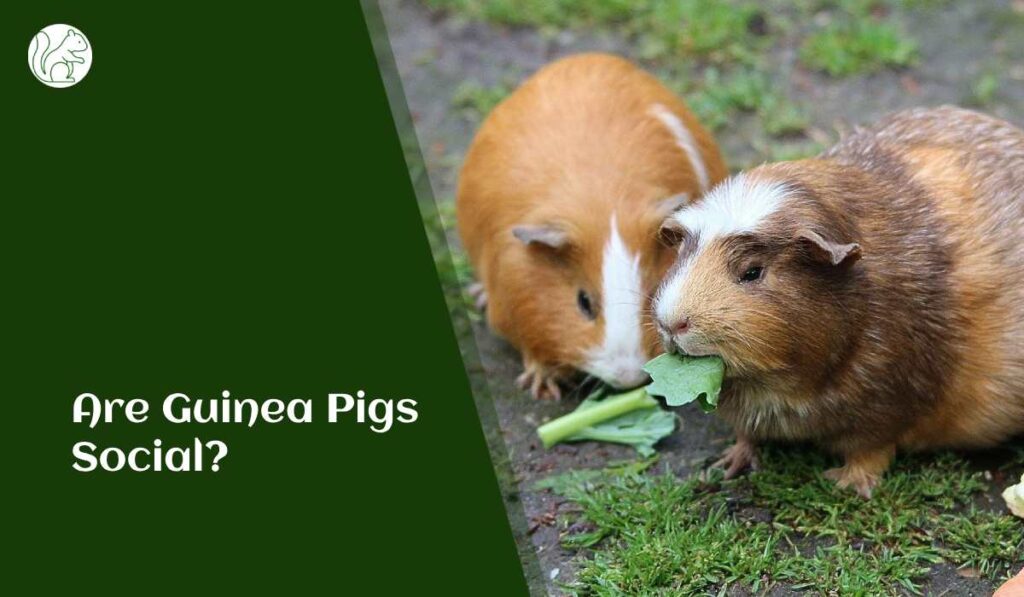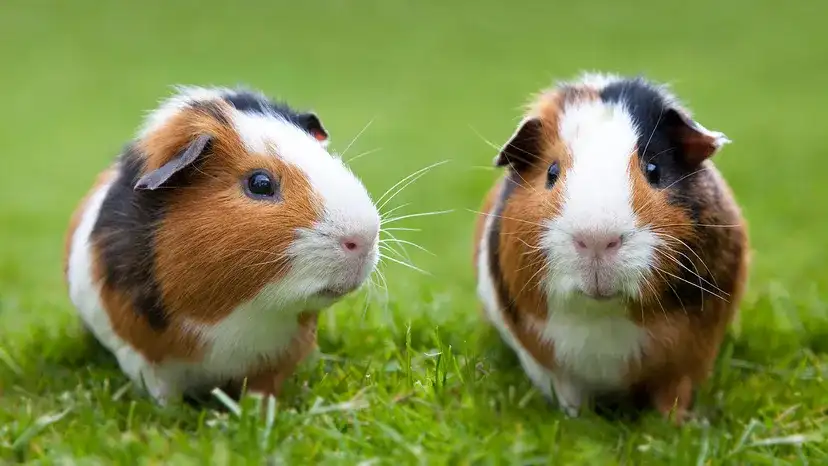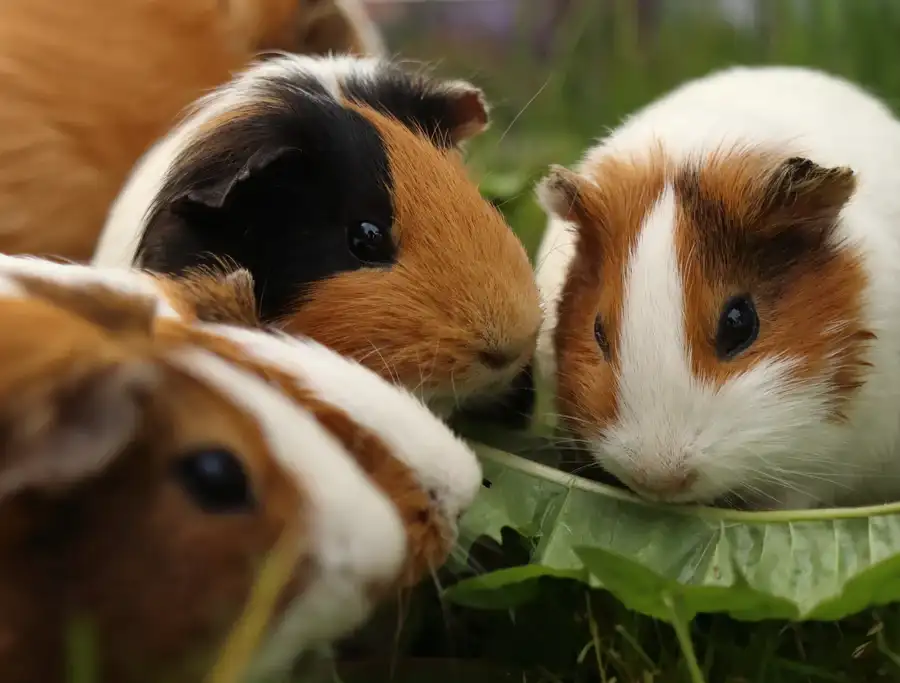Guinea pigs, also known as cavies, are popular pets cherished for their adorable appearance and gentle nature. If you’re considering adding a guinea pig to your family, you might be wondering, “Are guinea pigs social?” In this article, we will explore the social behavior of guinea pigs, shedding light on their natural inclinations, social needs, and how you can provide them with a fulfilling social environment.

Understanding the Social Nature of Guinea Pigs
Guinea pigs are highly social animals. In the wild, they live in groups, known as herds or colonies, consisting of several individuals. These small herbivores thrive on social interactions, which play a vital role in their overall well-being and mental stimulation.
The Importance of Companionship for Guinea Pigs
Companionship is crucial for the happiness and emotional health of guinea pigs. They are not solitary animals and can suffer from loneliness if kept alone for extended periods. Providing them with a suitable companion is highly recommended to ensure their social needs are met.
Pairing Guinea Pigs: Same-Sex or Mixed-Sex?
When it comes to pairing guinea pigs, it is important to consider their gender. Same-sex pairs or groups tend to work well together, especially if they have been introduced to each

other at a young age. However, if you choose to keep mixed-sex pairs, it is essential to have them spayed or neutered to prevent unplanned litters.
Bonding and Introducing Guinea Pigs
Introducing guinea pigs to each other should be done gradually to minimize stress and potential conflicts. Start by keeping the new guinea pig in a separate cage next to the existing one, allowing them to become familiar with each other’s presence. Then, gradually

introduce them in a neutral territory while closely supervising their interactions.
Signs of a Happy and Healthy Guinea Pig
When guinea pigs are content and socially fulfilled, they exhibit several positive behaviors. These include:
- Popcorning: This joyful behavior involves leaping in the air and twisting their bodies, indicating happiness and excitement.
- Vocalizations: Guinea pigs produce a variety of sounds to communicate with each other and express their emotions, such as purring, wheeking, and rumbling.
- Grooming: Mutual grooming is a common behavior among bonded guinea pigs, reinforcing their social bonds.
- Cuddling and Snuggling: Guinea pigs that get along well often enjoy cuddling up to each other for warmth and comfort.
The Role of Human Interaction
While guinea pigs benefit from the companionship of their own kind, they also form strong bonds with their human caregivers. Interacting with your guinea pig through gentle handling, petting, and talking to them helps strengthen the human-animal bond. However, it is essential to strike a balance between human and guinea pig companionship to ensure their social needs are adequately met.
Providing a Stimulating Environment
Creating an enriched and stimulating environment for your guinea pigs can enhance their social experiences. Consider providing the following:
- Spacious Enclosure: Guinea pigs require ample space to move around, explore, and engage in playful behaviors.
- Hiding Places: Provide tunnels, cozy huts, or hideouts where guinea pigs can retreat to when they feel the need for privacy or a sense of security.
- Toys and Enrichment: Offer a variety of toys, such as tunnels, chew toys, and puzzle feeders, to keep your guinea pigs mentally stimulated and entertained.
- Social Interaction: Regularly interact with your guinea pigs by spending time with them outside their enclosure, allowing them to explore their surroundings under your supervision.
- Fresh Food and Treats: Ensure your guinea pigs receive a balanced diet of fresh vegetables, hay, and pellets to promote their overall health and well-being.
Common Behavioral Issues
When guinea pigs are deprived of social interaction and companionship, they may develop certain behavioral issues. These can include:
- Depression and Withdrawal: Guinea pigs may become lethargic, lose interest in their surroundings, and show signs of depression if they lack social interaction.
- Aggression: Solitary guinea pigs or those with incompatible companions may exhibit aggressive behaviors, such as biting or chasing.
- Excessive Vocalization: Lonely guinea pigs may vocalize excessively, seeking attention and companionship.
The Benefits of Socializing Guinea Pigs
Providing social opportunities for your guinea pigs offers numerous benefits, including:
- Emotional Well-being: Socializing allows guinea pigs to fulfill their social needs, reducing the risk of loneliness and associated behavioral issues.
- Improved Health: Active and socially engaged guinea pigs tend to be healthier and more active, as social stimulation contributes to their overall well-being.
- Enhanced Bonding: Interacting with your guinea pigs and observing their social interactions can strengthen the bond between you and your pets.
Conclusion
In conclusion, guinea pigs are undoubtedly social animals that thrive on companionship and social interactions. To ensure their happiness and well-being, it is essential to provide them with suitable companions of the same or opposite sex, introduce them gradually, and create a stimulating environment that caters to their social needs. By understanding and meeting their social requirements, you can foster a strong bond with your guinea pigs and provide them with a fulfilling and enriched life.
Remember, guinea pigs depend on us to provide them with the social interactions they need to thrive. By being mindful of their social nature and taking steps to meet their needs, you can create a harmonious and joyful environment for these adorable pets.
So, if you’re considering adding guinea pigs to your family, embrace their social nature and enjoy the delightful companionship they offer.
